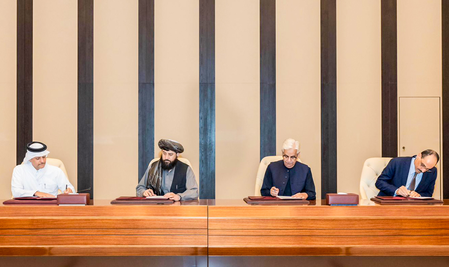

Kabul, Oct 28 (IANS) The latest round of talks between delegations of Pakistan and Afghanistan in Istanbul ended without any outcome with mediators citing several differences as the reasons that hindered any agreement on security concerns, local media reported on Tuesday.
The talks between Pakistan and Afghanistan, held for three consecutive days, ended without any breakthrough despite regional mediation efforts. Mediators admitted that the positions of two nations remained far apart as there were differences between two sides in expectations and priorities. These differences stopped officials of two nations from making any progress during the discussions, Afghanistan’s leading news agency Khaama Press reported, citing a Geo News report. The lack of coordination between two nations has sparked concerns about further escalation.
Pakistan has insisted that acting against Tehreek-e-Taliban (TTP) and preventing the fighters of the group to take sanctuary in Afghanistan remain important conditions for any agreement. Pakistan considers the TTP insurgency as direct threat to its national security.
Analysts have said that the failure of talks showcases mistrust between two nations and demonstrates the difficulty in curbing cross-border militancy. They have warned that prolonged stalemate risks destabilising both nations.
After the border clashes, Islamabad has warned that it will continue to target military operations inside Afghan territory if attacks by TTP militants continue. Security officials have stressed that decisive action is important to protect people and military positions along the border.
The first round of Pakistan-Afghanistan talks, mediated jointly by Qatar and Turkey, took place in Doha on October 18-19.
As the both delegations met in Istanbul for the second round of peace talks, Pakistan’s Defence Minister Khawaja Asif continued to engage in aggressive rhetoric by warning Kabul of an “open war” if the talks fail.
Pakistani media reported that Islamabad also wants to establish a “third-party oversight structure”, potentially co-chaired by Turkey and Qatar, to verify progress and address non-compliance.
Relations between Kabul and Islamabad have been undergoing a turbulent phase as the situation on the Durand Line has witnessed several clashes in the past few weeks.
Afghanistan’s FM Amir Khan Muttaqi’s week-long visit to New Delhi beginning on October 9 was viewed with extreme hostility by the Pakistani establishment, and on the very first day of Muttaqi’s visit, Kabul witnessed drone attacks.
Months after India put the Indus Water Treaty in abeyance in response to Pakistan-sponsored terror attack in Pahalgam on April 22, Afghanistan has also announced its plans to build dams on the Kunar River “as soon as possible”, which is likely to create a troubling unease in Islamabad.
–IANS
akl/as
